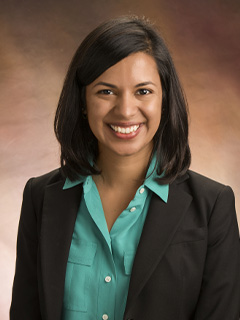HOW CAN WE HELP YOU? Call 1-800-TRY-CHOP
In This Section
Researchers Design Community Health Worker Model to Support Families of Medically Complex Children

Aditi Vasan, MD, MSHP, is developing a novel community health worker intervention to support families of medically complex children.
Editor's Note: The Agency for Healthcare Research and Quality awarded a Patient-Centered Outcomes Research Career Development Award to Aditi Vasan, MD, MSHP, faculty member at Clinical Futures and PolicyLab, two Centers of Emphasis at Children's Hospital of Philadelphia Research Institute. She also is an attending physician in the Division of General Pediatrics at CHOP and an assistant professor at the University of Pennsylvania. Dr. Vasan spoke with Cornerstone about her project, which aims to increase access to needed healthcare and to community resources for low-income and minoritized children with chronic conditions.
What is the children's health issue that you're trying to solve?

Aditi Vasan, MD, MSHP
We often put the onus on families to navigate our complicated healthcare and social service systems. My goal is for our health system to make it easier for our patients and families to access the resources they need.
I help lead a program at CHOP called Linking Families to Support, or LiFTS, in which we screen families for unmet social needs when they are admitted to the hospital and provide a one-time follow up during their hospital stay. The program helps to address food insecurity, difficulty with transportation to medical appointments, and difficulty paying utility bills, among other needs.
But my preliminary studies showed that a one-time, in-hospital intervention often is not enough. Families with medically complex children shared they could benefit from more post-discharge support to navigate the healthcare system, such as scheduling and traveling to follow-up appointments, and to help make sure they can access the social programs and community resources that we connect them with.
How did you become interested in the first-ever adaptation of the IMPaCT model to the pediatric population?
This grant will help build on my previous research on implementing and evaluating social needs screening and referral programs, reducing administrative burdens to improve access to government benefit programs, and quantifying care coordination burdens among parents and caregivers of children with medical complexity.
Individualized Management for Patient-Centered Targets (IMPaCT) is a standardized, theory-based, community health worker (CHW)-led approach to addressing care coordination needs and social needs for low-income adults with multiple chronic conditions.
During my National Clinician Scholars Program fellowship, I worked with Shreya Kangovi, MD, MS, who created the IMPaCT model at the University of Pennsylvania. Multiple randomized controlled trials in adults have shown that IMPaCT improves patient-reported quality of care while reducing acute care utilization. After seeing how effective it was for adults, I thought this CHW-led approach would be interesting to adapt to the pediatric setting, as a way to support caregivers of children with multiple chronic conditions following a hospital admission.
What makes the community health worker role unique?
I am excited to work with CHWs to better support these families in the hospital and in the vulnerable post-discharge period. CHWs are trustworthy individuals who share lived experiences and/or a background with the patients and families they serve. They provide an added layer of social support and can act as a first point of contact for families after they leave the hospital.
CHWs are trained to provide a full range of services, including connecting families to resources, providing social and emotional support, advocating for families, and helping families navigate healthcare and social service systems. They are especially well suited to bridge gaps between healthcare systems and the surrounding communities and to address health inequities.
Tell us about your project's goals and how you will accomplish them?
Our goal is to understand what would be most useful to these families when they leave the hospital, and how we can best provide that support in our co-design of this novel pediatric CHW intervention.
Our population of interest is children with medical and social complexity – typically children who are seen by two or more subspecialists and have one or more unmet social needs, as determined by our inpatient screening tool. We will interview families of these medically complex children, inpatient and outpatient providers who care for them, and other key stakeholders, including social workers and community health workers.
Data from the LiFTS program will help us gain understanding of how common these unmet social needs are among medically complex children, and how unmet social needs relate to healthcare utilization patterns in this population.
We will subsequently conduct a small pilot study of the intervention that we've designed with our stakeholders. This will evaluate its effectiveness in helping parents and caregivers navigate complex health and social service systems and access the medical care and government benefits they need to keep their children healthy and safe.
How do you promote equity in a family-centered manner, as participants identify their care coordination and social needs?
This is a challenge that we are continuously thinking about. Families answer questions using a tablet-based screening tool, so there is less stigma than answering questions verbally.
We also want to give families the ability to prioritize their needs and opt-in or opt-out of assistance. For example, in addition to asking, "Do you ever worry about not having enough food for your family?" we also ask, "Would you like help with this?"
We recognize that not everyone feels comfortable disclosing needs or requesting help, and we aim to prioritize families' agency, autonomy, and privacy.
How has CHOP encouraged your research?
I came to CHOP in 2015 for my pediatric residency training, with an interest in pediatric health equity, and family and community influences on child health. Guided by mentors in PolicyLab and Clinical Futures, I found my career path at the intersection of health policy and child health equity, with a specific focus on building a more equitable health system and redesigning social service programs to be more accessible for children and families living in poverty.
The mentorship of Clinical Futures faculty members including Alex Fiks, MD, MSCE; Chén C. Kenyon, MD, MSHP; Chris Feudtner, MD, PhD, MPH; Tyra Bryant-Stephens, MD; and many others has been instrumental in carrying out this work.


